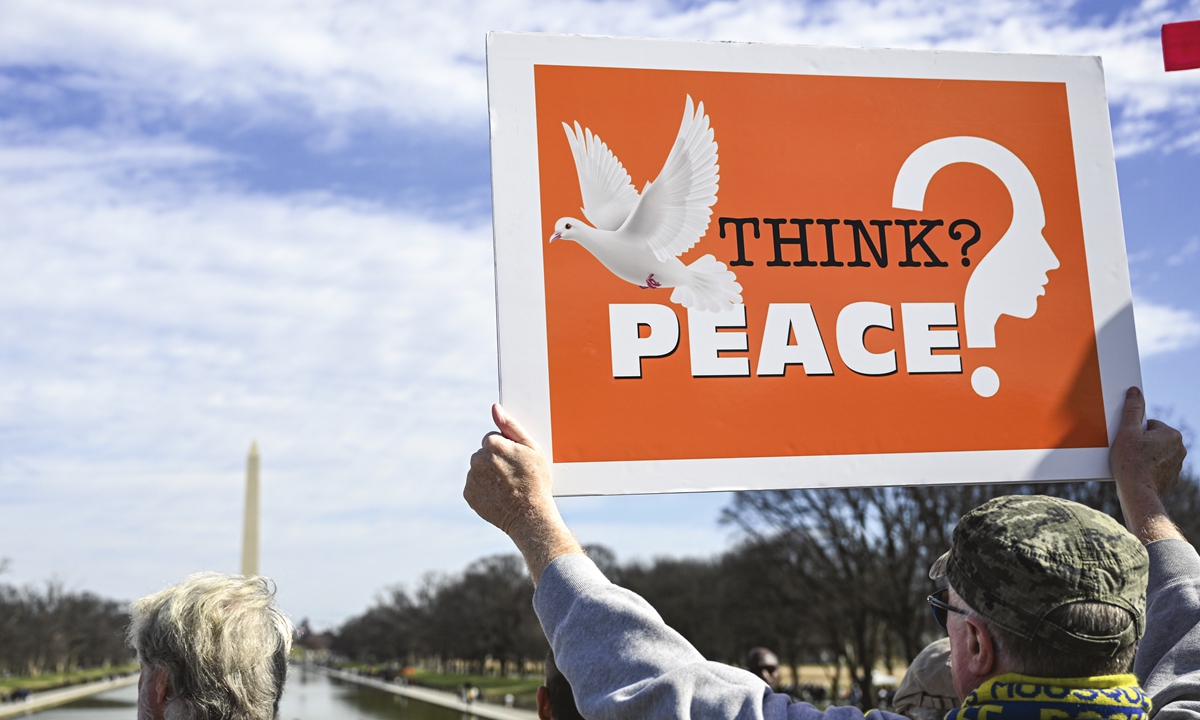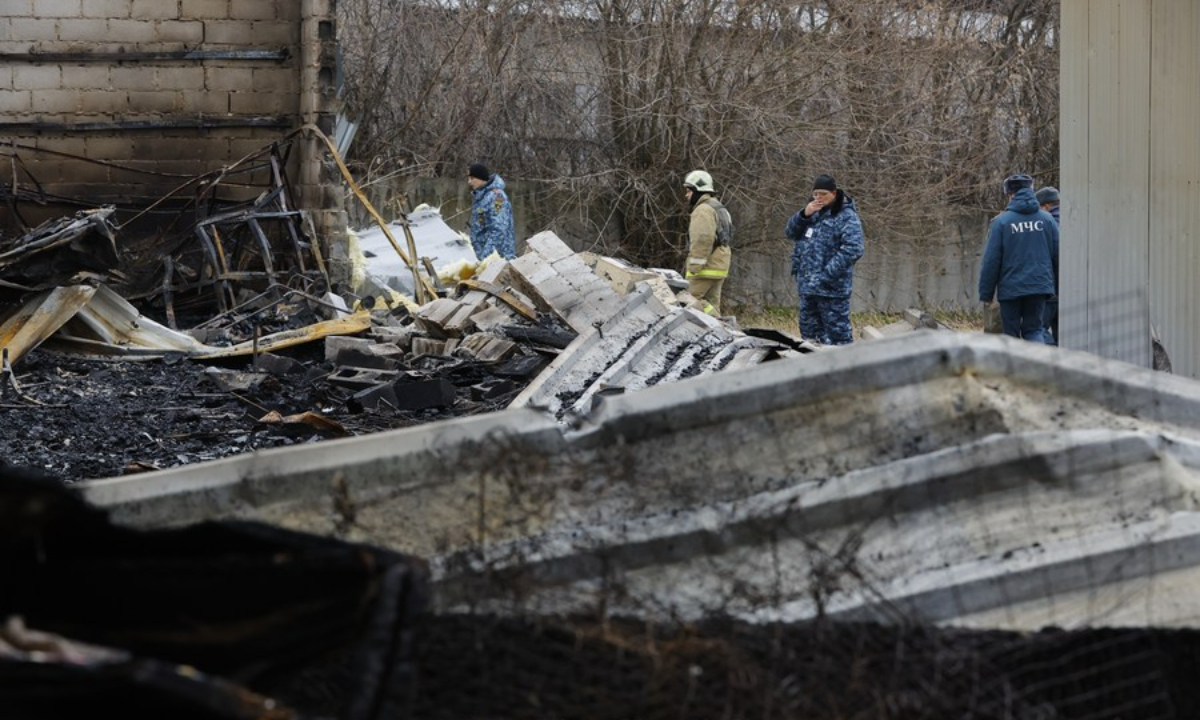Crisis accentuates rising calls to end animosity as Russia-Ukraine conflict enters 2nd year
US urged to stop fanning ffames as lingering tension increases uncertainty

Several hundred protesters gather for an anti-war demonstration to oppose US military aid to Ukraine in front of the Lincoln Memorial in Washington DC on February 19, 2023. The rally's organizers and speakers also called for the Pentagon's budget to be slashed and NATO to be disbanded. Photo: VCG
On Friday, the Russia-Ukraine military conflict dragged on to its one year mark with no positive sign of a truce in sight. With the conflict not only profoundly changing geopolitics in the European continent and the world, but also redefining countries' notions on security, the majority of the international community is calling on all parties to press the stop button and urging some countries to stop adding fuel to the fire before a heavier impact is brought to the global economy and development.
Calling the past year one of "sorrow, faith and unity," Ukrainian President Volodymyr Zelensky said in a post on Telegram on Friday that this will be a year of "victory," implying that the conflict will continue. No delivery of message was reported from Russian President Vladimir Putin as of press time on Friday, but his remarks to the Federal Assembly on Tuesday that "Russia cannot be defeated on the battlefield" also showed Russia's decision to follow through with its military operation.
Reactions from different parties varied on the one-year anniversary of the Russia-Ukraine conflict. On Friday, the US-led NATO, which bears the initial responsibility for inciting the confrontation, issued a statement restating its support for Ukraine; the US, following President Joe Biden's whirlwind trip to Ukraine, planned to transport more weapons to the battlefield, and announced a new range of sanctions against Russia; and the European Union reaffirmed its backing for Ukraine but will have to swallow more bitter pills.
More forces around the world are calling for a truce. At its resumed 11th emergency special session, the UN General Assembly adopted a new resolution calling for an end to the war, only hours before the conflict enters its second year on Friday. Also on Friday, China issued a 12-point position paper and called for a cessation of hostilities and resumption of peace talks, and an end to unilateral sanctions and Cold War mentality.
The Russia-Ukraine conflict has changed the world, with more people feeling that war is not far away from their daily lives and countries reconsidering their notion of traditional security, especially in the military field, Wang Chenxing, a research fellow on national security from the Chinese Academy of Social Sciences (CASS), told the Global Times.
Apart from Ukraine and Russia, Europe has suffered more than others and has paid the price in terms of politics, the economy and military. The EU's unity is being challenged and its pursuit of strategic autonomy has been shattered, becoming more reliant on the US in politics and security, Wang said.
More anti-war protests have been seen in many European cities in recent days to voice opposition to the EU's and the US' decision to supply weapons. For example, peace activists are taking a Europe-wide weekend of action starting in Italy on Friday, and demonstrations are planned for Brussels as well as cities in Portugal and France throughout the weekend, according to media reports.
By inciting the conflict between Ukraine and Russia, the US has succeeded in estranging Russia from Europe at the same time realizing its ambition to replicate the mess in other regions to compete with its rival. With the US beefing up its campaign to form small cliques globally, the world has been burdened with more confrontations and growing uncertainties, said Wang, noting that this atmosphere is also worrying more countries and casting a shadow over international cooperation.

People inspect the aftermath of shelling of the city market in Donetsk, Dec 12, 2022. Photo:Xinhua
Global economic crisis
The lingering impact of the Russia-Ukraine conflict is most strongly felt on global development. For the global economy, 2022 was a year shaped by unprecedented energy and food crises, runaway inflation that pushed developing economies to the brink of bankruptcy, as well as a polarized world order that further led to the breakdown of global supply chains, all of which were pertaining to the protracted Russia-Ukraine conflict.
While the world continues to bear the brunt, observers pointed out that how the global economy navigates these crises this year is highly dependent on how the two sides settle the dispute.
Last year, natural gas and electricity prices skyrocketed to a record high in Europe, after Brussels, along with other Western countries, jointly slapped rounds of sanctions on Russia's energy imports, prompting countermeasures from Russia. The sanctions have backfired on the European economy, whose manufacturing has been running on fumes as they were mainly powered by Russian imports.
Europe's natural gas prices had once jumped to ten times the pre-pandemic level last year, while the trading price of electricity futures due next year has also once shot up to eight times in major European markets compared with 2022, news website the paper.cn reported.
The hefty energy bill, combined with soaring prices of basic necessities, has left many European residents and manufacturers reeling. A local farmer in Hungary told the Global Times that before the arrival of winter last year, his family had to chop wood in advance and use the stockpiles as an alternative heating source, or he would face bankruptcy over Christmas.
Rising production costs have also reportedly prompted a raft of European companies, including German automaker BMW and Arcelor Mittal, one of the world's largest steelmakers, to consider relocating their manufacturing lines to other bases, such as the US, fueling de-industrialization fears in Europe and further shattering the global supply chain.
The rest of the world was also caught in the crossfire of the ever-expanding crisis, in particular a number of debt-ridden emerging economies such as Sri Lanka. According to data from the United Nations Food and Agriculture Organization, up to 205 million people in 45 countries and regions are expected to face acute food insecurity and will be in need of urgent assistance from October 2022 to January 2023.
According to the IMF, world inflation reached 8.8 percent in 2022, compared with 4.7 percent in 2021. It predicted that inflation will dip to 6.5 percent this year, but still above pre-pandemic levels of about 3.5 percent.
Cui Hongjian, director of the Department of European Studies at the China Institute of International Studies, told the Global Times on Friday that while the emergency situation will ease in 2023, the lingering conflict will still create uncertainties which will likely continue weighing on global economic prospects. "The extent of the consequences hangs on whether Russia and Ukraine head toward a solution," Cui said.
Analysts warned that in the short-term, the disarray in global supply chains won't see any sign of reversing, which could further dent the economic outlook in particular in Europe. The EU bloc has been ramping up efforts to reduce its reliance on Russian natural gas, replacing it with imports from countries like the US, Canada, Algeria while also gearing up for a renewable energy push.
Lin Boqiang, director of the China Center for Energy Economics Research at Xiamen University, told the Global Times that energy supply will remain tight this year in Europe despite a recent drop in prices. "It takes a certain amount of time for Europe to build basic infrastructure for energy transportation, and this means energy prices won't return to normal in the short term," Lin said.
But one thing remains certain this year - the US will continue the playbook last year, pocketing revenues from the crisis, at the cost of the interests of the rest of the world, especially that of its ally Europe, analysts said.
"From a strategic view, the US is the outright biggest winner of the crisis. In the past, US LNG lacked competitiveness in the European market, but it has 'wedged into the space' by pressuring Europe to follow its sanctions against Russia," Lin explained.
With no signs of peace talks in sight, analysts predicted that the Russia-Ukraine conflict may last for months and further affect global development. As no country is isolated from the rest of the world, the US will also suffer the bitterness brought by war, analysts said.


